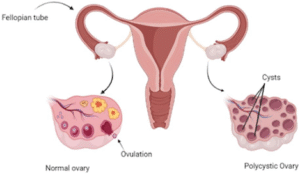Polycystic Ovarian Syndrome (PCOS): Understanding the Condition, Diagnosis, and Treatment
Polycystic Ovarian Syndrome (PCOS) is one of the most common endocrine disorders affecting individuals of reproductive age. It is a complex condition with a wide range of symptoms and health implications. This article explores the causes, symptoms, diagnosis, and treatment of PCOS, alongside awareness initiatives and resources for those affected.
1. What is Polycystic Ovarian Syndrome (PCOS)?
PCOS is a hormonal disorder characterized by multiple small cysts on the ovaries, irregular periods, and elevated levels of male hormones (androgens). It affects approximately 10% of people with ovaries, often leading to infertility and other health complications, such as diabetes and cardiovascular disease.
|
|
| Source: Nautiyal, Himani & Imam, Syed & Alshehri, Sultan & Ghoneim, Mohammed & Afzal, Muhammad & Alzarea, Sami & Guven, Emine & Al-Abbasi, Fahad & Kazmi, Imran. (2022). Polycystic Ovarian Syndrome: A Complex Disease with a Genetics Approach. Biomedicines. 10. 540. 10.3390/biomedicines10030540. |
2. Causes of PCOS
The exact cause of PCOS remains unclear, but it is believed to involve a combination of genetic and environmental factors. Insulin resistance, where the body’s cells do not respond effectively to insulin, plays a significant role in the development of PCOS. Excess insulin leads to higher androgen levels, which disrupt ovulation.
Image Suggestion: Diagram showing the relationship between insulin resistance and hormone imbalance in PCOS.
Image Source: Cleveland Clinic or educational medical platforms like WebMD.
3. Symptoms of PCOS
PCOS symptoms vary but may include:
- Irregular or absent periods
- Excess hair growth (hirsutism)
- Acne and oily skin
- Weight gain or difficulty losing weight
- Thinning hair on the scalp
- Dark patches of skin (acanthosis nigricans)
4. Diagnosing PCOS
PCOS is diagnosed through a combination of medical history, physical examination, and tests such as:
- Ultrasound imaging of the ovaries
- Blood tests to measure hormone levels
- Blood glucose and insulin levels
The “Rotterdam Criteria” is commonly used, where two of the following must be present for a diagnosis:
- Irregular periods or lack of ovulation.
- High levels of androgens.
- Polycystic ovaries on an ultrasound.
5. Treatment and Management of PCOS
While there is no cure for PCOS, treatments focus on managing symptoms and reducing the risk of complications. Treatment options include:
- Lifestyle Changes: Diet and exercise to manage weight and insulin resistance.
- Medications: Birth control pills to regulate periods, anti-androgens to reduce male hormones, and metformin for insulin resistance.
- Fertility Treatments: Clomiphene or letrozole for ovulation induction.
6. Complications Associated with PCOS
PCOS increases the risk of several health conditions, including:
- Type 2 diabetes
- Cardiovascular disease
- Endometrial cancer
- Sleep apnea
- Mental health issues such as depression and anxiety
7. Polycystic Ovarian Syndrome Awareness Month
September is designated as Polycystic Ovarian Syndrome Awareness Month. This initiative aims to raise awareness about PCOS, its symptoms, and the importance of early diagnosis and treatment. It also seeks to advocate for better research and support for those affected by PCOS.
8. Treatment Institutions and Resources
For those seeking treatment or more information, here are some top institutions specializing in PCOS management:
-
Mayo Clinic: Comprehensive care for PCOS with a focus on personalized treatment plans.
-
Cleveland Clinic: Offers advanced treatments for PCOS-related infertility and metabolic complications.
-
Johns Hopkins Medicine: Provides specialized care for hormonal disorders, including PCOS.
-
NHS: UK-based healthcare services offering diagnostic and treatment options for PCOS.
Conclusion
Polycystic Ovarian Syndrome is a complex and often misunderstood condition that affects millions globally. Awareness, early diagnosis, and effective management are essential to improving the quality of life for those affected by PCOS. Through continued research and advocacy, progress can be made in understanding and treating this condition.

